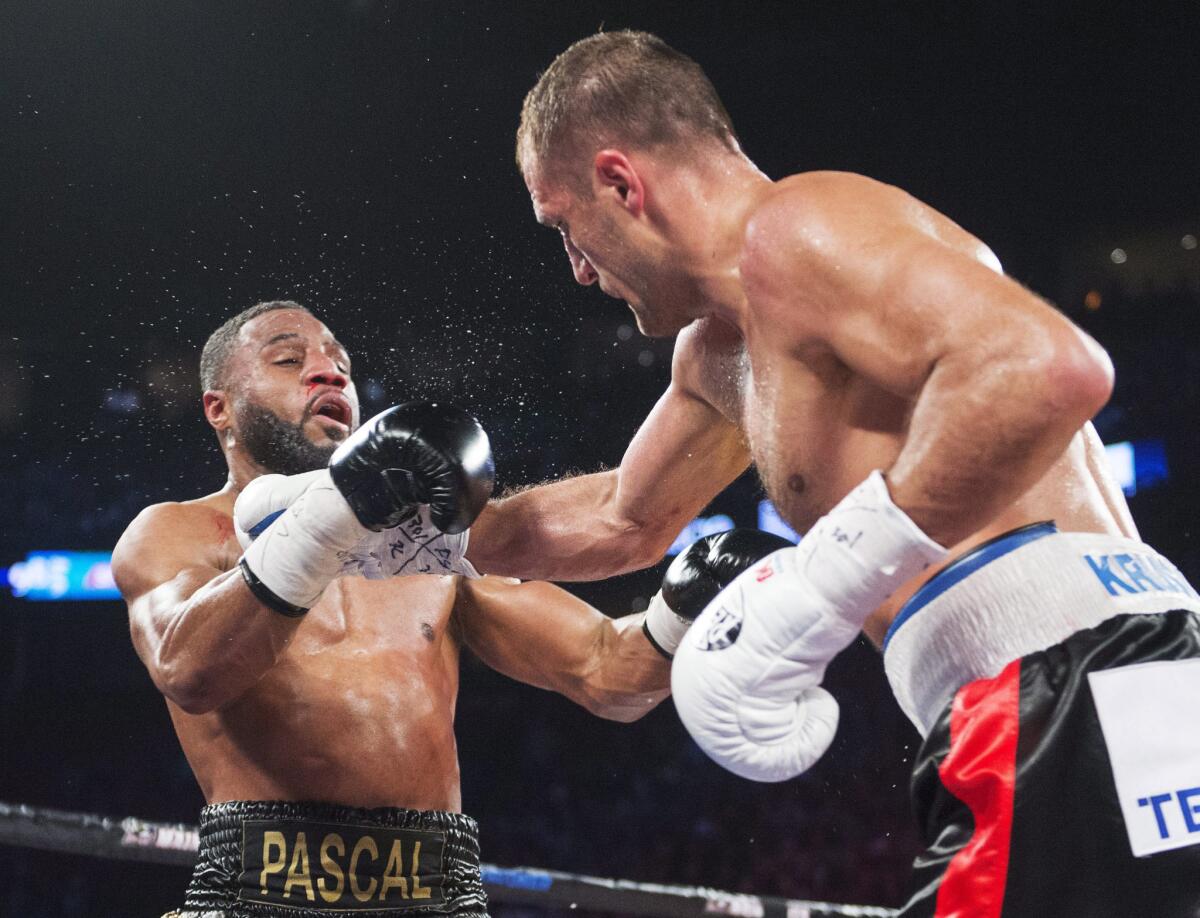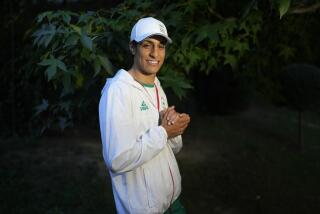Revisiting his dream — and pain — boxing champ Sergey Kovalev returns to Russia

- Share via
Reporting from Las Vegas — It might be unbelievable now, considering the lack of mercy Sergey Kovalev shows in the boxing ring, but there was a time he was a bit of a crybaby.
“My first two years in boxing, my coach would tell me, ‘You must be a champion, don’t cry,’ after each workout,” Kovalev said, reflecting on the excruciating hand pain he’d experience from extended daily punching in horsehair gloves.
“Nobody was going to rub your head to make you feel better. There were lots of kids — 25 to 30 in there — and we grew up in a neighborhood where you cannot show pain or cry.”
That cold toughness has made him one of boxing’s top five pound-for-pound fighters and Kovalev (29-0-1, 26 knockouts) will return to Russia on Monday to defend his World Boxing Assn., World Boxing Organization and International Boxing Federation light-heavyweight belts on HBO against heavy underdog Isaac Chilemba (24-3-2, 10 KOs).
Chilemba presents an opportunity for Kovalev to remain busy as his first pay-per-view bout beckons on Nov. 19 against unbeaten former super-middleweight champion Andre Ward (29-0, 15 KOs) of Oakland.
“The best fight that can be made in boxing,” Kovalev promoter Kathy Duva calls the bout to be fought at T-Mobile Arena in Las Vegas.
So, as the attention on Kovalev expands, he wants it known that a heart beats inside him, the same one that led him to chase his dreams as a youth raised by a single mother, occasionally in poverty.
One of Kovalev’s favorite hobbies growing up in the industrial Russian town of Chelyabinsk was patiently making paper models — a train, cars, a Jeep, an airplane.
After delicately finishing the cutting, gluing and assembling, he proudly showcased his finished products on a shelf in his bedroom.
“That was the best thing I did for a long time,” Kovalev said.
Unfortunately, the handiwork was within reach of his sister’s toddler son, who got his hands on the models and tore up most of them.
“I cried some more,” Kovalev said.
The tears have dried now as Kovalev prepares for his first bout back home since Dec. 5, 2011, when in the same venue in Ekaterinburg his opponent, Roman Simakov, died of head injuries suffered in the bout.
In a haunting scene, Simakov was carried out of the ring on a makeshift stretcher, and then Kovalev’s hand was raised in triumph.
“That was five years ago, I already forgot everything,” Kovalev said in an April interview with reporters near Los Angeles International Airport, after first declining to discuss Simakov’s death. “Life is great for me now. We’re going [back to Russia] to do our job — make great fights in boxing, that’s what I try to do.”
From Chilemba, Kovalev expects a defensive effort — with some parallel to Ward — that could require several rounds of work, like the 12-round beating he delivered to former veteran middleweight champion Bernard Hopkins in November 2014.
“I must get my victory for my next possible fight,” Kovalev said. “You lose once, everything goes broke.
“Isaac deserves this fight. He fights with a lot of defense, almost wrestling. From these kinds of fights, you get experience. From an easy opponent, I don’t get experience. This motivates me.”
Russian fans will also get their first look of Kovalev adorned in his belts inside a boxing ring, a homecoming that generated deep memories in the fighter’s conversation with The Times and Ring Magazine at the MGM Grand in April.
Raised by his mother, Nadezhda, whose name translates to “Hope,” Kovalev watched her report to work daily as a crane operator in a factory.
He sold newspapers on the corner, and as the Soviet Union broke down, he felt the effects. “We used to eat cakes, my dog would eat sausage … that all stopped,” he said.
“Growing up, I realized only boxing can bring me what I want to be — it was my dream to get money for my family,” Kovalev said.
“I don’t feel as if I have a talent. I have a love of work. What I’ve done is a result of my hard work. I decided to be a champion. … If I see my goal, I will try to get this goal in any way. I followed my dream.”
He soured on corruption in amateur boxing, which he says contributed to his not qualifying for the Olympics, and turned pro as a 25-year-old in 2009 after meeting manager Egis Klimas, who also manages super-featherweight world champion Vasyl Lomachenko.
“I don’t like boxing when it goes to the judges,” Kovalev said. “As a pro, you have a chance in 12 rounds to stop your opponent.”
Kovalev was ultimately directed to trainer Abel Sanchez’s Summit Gym in Big Bear, where he sparred three days a week with Sanchez’s prized talent, unbeaten three-belt middleweight champion Gennady Golovkin.
“He was the most professional, strong fighter I’ve ever gone against,” Kovalev said. “Every second you’re in there with him, he has your attention.”
But the rapport with Sanchez didn’t last, and they split after the Simakov bout.
“I push myself hard enough. I don’t like someone pushing me for early-morning runs after a tough workout the night before,” Kovalev said.
With trainer John David Jackson, Kovalev is 12-0 with 11 stoppages, winning his first belt in August 2013.
“I wanted to be free. I’m free,” Kovalev said. “I feel excited to be on this level. You think, ‘Maybe one day … ,’ but you never know, and to be honest, I never believed it’d be possible to be where I am.”
More to Read
Go beyond the scoreboard
Get the latest on L.A.'s teams in the daily Sports Report newsletter.
You may occasionally receive promotional content from the Los Angeles Times.











